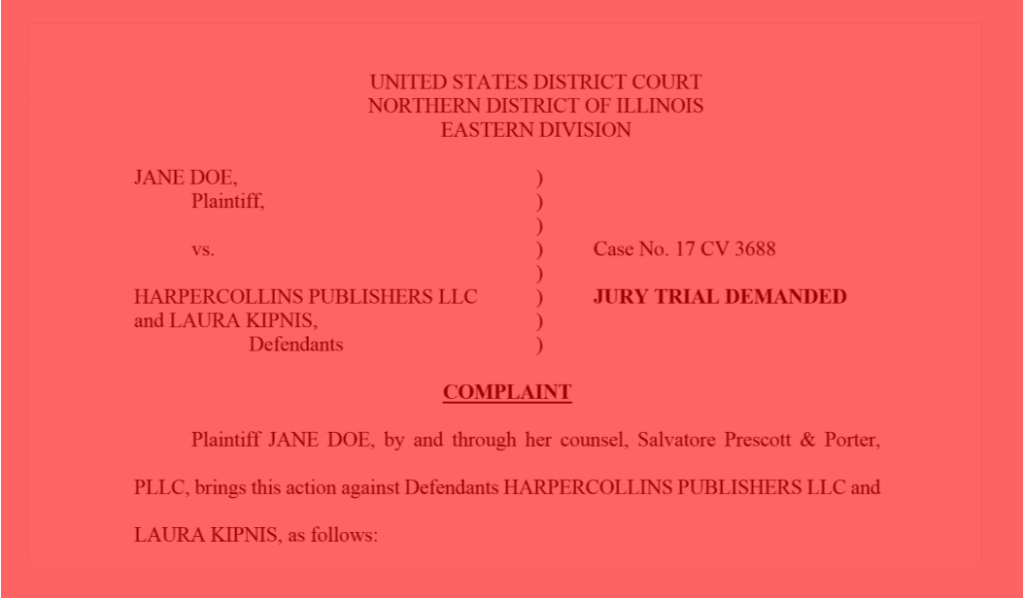Kipnis and Publisher Sued
Laura Kipnis, a professor in the School of Communication at Northwestern University, and Harper Collins, the publisher of her recent book, Unwanted Advances: Sexual Paranoia Comes To Campus, are being sued by a Northwestern philosophy graduate student, “Jane Doe,” for public disclosure of private facts, false light invasion of privacy, defamation, and intentional infliction of emotional distress. The issues at hand originally stem from Title IX complaints against former Northwestern University professor of philosophy Peter Ludlow.
A press release from Doe’s attorney, states:
A graduate student in Northwestern University’s Philosophy Department filed suit in federal court today in the Northern District of Illinois alleging that Northwestern Professor Laura Kipnis defamed her and invaded her privacy by publishing a false portrayal of her and making misrepresentations about her in her new book, Unwanted Advances: Sexual Paranoia Comes to Campus. The suit also alleges that Kipnis invaded her privacy by disclosing private text messages and other personal details about her private life gleaned from a confidential Title IX process.
“While authors certainly have a First Amendment right to write a book and express their opinions, they aren’t at liberty to misrepresent the facts and publish intimate details of a private person’s life to advance their own agenda,” said Jennifer Salvatore, who along with Julie Porter at Salvatore Prescott & Porter, PLLC represents the graduate student. “This book does serious harm to our client’s career and reputation. The treatment of our client in this book is outrageous especially coming from a professor at her own University.”
A copy of the lawsuit is here. Below are some excerpts:
- In defending Ludlow and attempting to (falsely) reframe him as the victim of malicious female students and a Title IX process run amok, KIPNIS gratuitously discloses
private and embarrassing details about the personal life of Plaintiff, a current Northwestern graduate student. KIPNIS writes about and publicizes private text messages and
information about Plaintiff obtained from Ludlow and contained in confidential Northwestern records. Many of these text messages were taken out of context, none of
them were fact-checked with Plaintiff, and all of them were private communications that Plaintiff never intended to be publicized for the world to read. (pp.1-2) - In addition to disclosing private details about the Plaintiff’s personal life, KIPNIS made and HARPERCOLLINS published false and damaging statements about Plaintiff and presented her in a false light as lying, manipulative, and litigious, despite having reason to know that this portrayal was false. Defendants made multiple misrepresentations of fact about Plaintiff, including misrepresenting the nature of Plaintiff’s relationship with Ludlow and misrepresenting a number of facts about Plaintiff—including falsely claiming that she had initiated sexual harassment charges against a male student and that she had made up an allegation of rape against Ludlow. (p.2)
- Defendants recklessly pursued fame and profit without regard for the harm their actions would cause to Plaintiff, a young and promising graduate student who—rather than being on a mission to end Ludlow’s career (as Kipnis suggests)—in fact only very reluctantly came forward to disclose his conduct after she learned of other allegations of inappropriate sexual conduct with students. Now, as a result of Defendants’ misrepresentations about Plaintiff and the disclosure of private and embarrassing personal facts about her life, her personal life and professional career prospects have been upended and her reputation has been significantly harmed. (pp.2-3)
Beginning on page 4, the complaint contains Jane Doe’s account of the relevant facts, which provide a different picture of what happened between Doe and Ludlow than is represented by Kipnis in her book, or by Ludlow.
In addition to the complaints about Kipnis, there are complaints about the publisher of her book, Harper Collins:
- Defendant HARPERCOLLINS PUBLISHERS, LLC’S failure to adequately investigate is particularly troubling given that the publishing company had reason to know that Defendant LAURA KIPNIS had had a complaint filed against her by Plaintiff in the past and was angry about being brought up on Title IX charges. KIPNIS had a clear motive to retaliate. Moreover, KIPNIS and Ludlow became friends in the course of Plaintiff’s Title IX charges against both of them, and KIPNIS was motivated to help Ludlow get back at Plaintiff and provide an alternative theory about his own conduct. (p.15)
- Neither Defendant LAURA KIPNIS nor anyone affiliated with Defendant HARPERCOLLINS PUBLISHERS LLC ever bothered to reach out to Plaintiff to determine the accuracy of the information about her contained in the book. Nor did Defendants seek Plaintiff’s permission to publish highly personal, embarrassing, and damaging information about her. Moreover, KIPNIS possessed information that contradicted Ludlow’s version of events, but chose not to publish that information because it did not fit with her narrative of Ludlow as victim. (pp.15-16)
- Defendant LAURA KIPNIS claims that Professor Ludlow gave her access to his private text messages with Plaintiff. Neither KIPNIS nor Defendant HARPERCOLLINS PUBLISHERS LLC sought to determine whether these text messages were authentic, complete, or presented in context. Nor did Defendants seek Plaintiff’s permission to publish her private text messages. (p.16)
Details of the specific legal complaints—public disclosure of private facts, false light invasion of privacy, defamation, and intentional infliction of emotional distress—can be found beginning on page 17 of the lawsuit.


